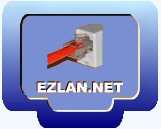|
EZLAN.NET
Copyright © 2001-2008
|
Hardware and Software Specifications, Examples, Links, and other info. are valid at the publishing time. In case it become invalid use the Internet Search. 1st Published, Feb. 2005 Over 13.000,000 Hits Site Wide in 2010, and Counting. 
"Speed" (Bandwidth) expectation of Ethernet Home Networks using Windows. The numbers for Wireless Network are relates to default setting when the source and the client are few feet apart. The number below are derived from measuring real time File Transfer. Number that
are displayed by the Network's information windows usually derive from the info
in the network card 's drivers and are Not accurate. Wired 1000Mb/sec. See here:
Giga and Peer to Peer Small Networks
Internet The Speed of Consumers Internet connection varies
according to ISP's contracts. The newer Verizon
FIOS can goes up to 20Mb/sec. Special attention to Router's choice is need when
it is used with FIOS Internet connetction. Wired /Wireless Cable DSL Routers. A Wire only Router is a combo unit of Routing Circuits, and a Switch. A Wireless Router is a combo unit of Routing circuits, Switch, and Wireless Access Point Each part of the combo has it own "Speed" Rating and it is not related one to the other. The Routing circuits are usually 10Mb/sec. or 10/100Mb/sec. As indicated above the average "Speed" of Entry Level Cable Internet is 6Mb/sec. So even 10Mb/sec Routing circuits are well above the average "Speed" of good Internet connection. Almost all the Switches that are part of the combo are 100Mb/sec. The "Speed" of the Switch is related only to the "Speed" of the Local Network (LAN) traffic and Not to the Internet Connection. The Wireless part of the combo would be rated according to one of the Wireless Standard as mentioned above. Recently we see releases of Giga Wireless Cable/DSL Routers. The Giga (1000Mb/sec.) is related only to the Switch part of the Combo. The "Speed" of the Internet Connection or and Internet Downloads has Nothing to do with the Giga capacity. The Giga capacity of the switch might help to improve the Speed of the LAN for local file transfer etc. If you have $1000 it is not going to turn into $10,000 when you put it into a bigger Wallet. Similarly Internet Connection of 5Mb/sec. it is not going to increase because the switch is 1000Mb/sec. capable. Related Links: Optimizing & Measuring the "Speed" of Internet Connection Wireless Hardware - What Should I get? Giga and Peer to Peer Home Networks
|